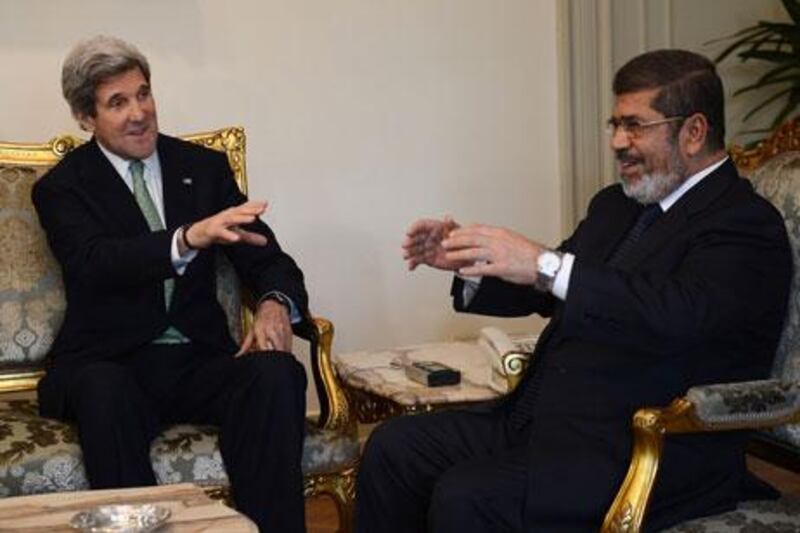CAIRO // John Kerry, the US secretary of state, yesterday pledged US$250 million to support Egypt’s “future as a democracy” but urged president Mohammed Morsi to heal the country’s political rifts.
During his two-day visit, Mr Kerry reinforced the US position that Egypt urgently needs to restore security and bolster the economy nearly two years after a popular uprising brought down Hosni Mubarak’s authoritarian government.
“The path to that future has clearly been difficult and much work remains,” Mr Kerry said in a statement after wrapping up two days of meetings with businessmen, officials and political groups.
Egypt has historically been a strategic ally of the US in the region, but Washington is concerned that further unrest could have knock-on effects across the region.
“The best way to ensure human rights and strong political checks and balances ... is through the broadest possible political and economic participation,” Mr Kerry said after meeting Egyptian foreign minister Kamel Amr on Saturday. “We believe that being active, engaging in peaceful participation is essential to building strong communities and healthy democracies.”
He acknowledged democratic politics was not easy in an apparent reference to the continuing power struggles in the US over how to reduce the nation’s debt that has resulted in deep spending cuts.
“There must be a willingness on all sides to make meaningful compromises on the issues that matter most to all of the Egyptian people,” he said.
In his two-hour meeting with Mr Morsi, Mr Kerry emphasised the importance of Egypt obtaining a US$4.8 billion (Dh17.6bn) loan from the International Monetary Fund. Negotiations for the loan have been repeatedly delayed as Egypt revised an economic reform plan that would rein in spending and increase government revenues through broadening the tax base.
The loan would temporarily ease pressures on the government, but also unlock billions of dollars more from the US, the European Union and other donors who have made their aid contingent on Egypt first obtaining the IMF’s seal of approval on the country’s economic plan.
An injection of funds is desperately needed to narrow a budget deficit that is causing of shortage of fuel products and lower unemployment that is feeding unrest across the country.
In order for there to be an agreement on the IMF loan “there has to be basic political agreement among all the various players in Egypt” as well as “basic economic consensus on reforms to support the IMF deal”, a US official travelling with Mr Kerry said.
Mr Kerry cited Egypt’s “extreme needs” and Mr Morsi’s “assurances that he plans to complete the IMF process” when he told the president that the US would provide $190m of a long-term $450m pledge “in a good-faith effort to spur reform and help the Egyptian people at this difficult time.”Separately, Mr Kerry announced $60m for a new fund for “direct support of key engines of democratic change,” including Egypt’s entrepreneurs and its young people.
After being rebuffed by several top officials from the National Salvation Front, an umbrella group opposed to Mr Morsi, it was clear Mr Kerry would likely have a limited effect on Egypt’s political deadlock. Mohamed ElBaradei and Hamdeen Sabahi, two of the group’s top officials, refused to meet him in person because of calls from the US for them to reconsider their boycott of parliamentary elections scheduled for late April. There were reports yesterday that Mr Kerry spoke to Mr ElBaradei by telephone.
The group has said it would only take part if Mr Morsi replaces his government and creates a more inclusive atmosphere for politics. Opposition leaders have accused Mr Morsi’s political backers, the Muslim Brotherhood, of attempting to take over all aspects of the state.
Evidence of the continuing instability could be seen across the country during Mr Kerry’s visit, which ended yesterday with hundreds of Egyptian football fans briefly blocking a main road to Cairo’s international airport, forcing a short delay in the secretary of state’s departure.
The Al Ahly fans blocked the road in anticipation of a court ruling this weekend in which rival supporters in Port Said face sentencing over a deadly post-match riot. The Al Ahly fans want them convicted.
In demonstrations related to the same 2012 football riot, protesters in Port Said pelted a prison with rocks and Molotov cocktails after authorities transferred 39 defendants to another prison. The ministry of interior said it moved the men for their safety, but the decision inflamed emotions in Port Said where many say the defendants were scapegoats.
In Ismailia, south of Port Said, dozens of protesters yesterday forced the several ministries to close. Groups there and in other cities around Egypt have been participating in a civil disobedience campaign to protest against Mr Morsi’s government.
bhope@thenational.ae
* With reporting from the Associated Press and Agence France-Presse





